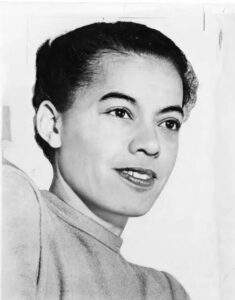 Pauli Murray (November 20, 1910 – July 1, 1985) was a pioneering American civil rights activist, legal scholar, author, and Episcopal priest. Her work significantly influenced the civil rights movement and expanded legal protections for gender equality.
Pauli Murray (November 20, 1910 – July 1, 1985) was a pioneering American civil rights activist, legal scholar, author, and Episcopal priest. Her work significantly influenced the civil rights movement and expanded legal protections for gender equality.
Early Life and Education
Murray was born in Baltimore, Maryland, but was essentially orphaned and raised by her maternal aunt in Durham, North Carolina. She moved to New York City at age 16 to attend Hunter College, graduating in 1933. Murray’s early activism began with a 1940 arrest for sitting in the whites-only section of a Virginia bus, which inspired her to pursue a career in civil rights law. She graduated first in her class from Howard University Law School in 1944 but was denied post-graduate work at Harvard University due to her gender, a prejudice she termed “Jane Crow” in reference to Jim Crow laws.
Legal and Activist Career
Murray earned a master’s degree in law from the University of California, Berkeley, and became the first African American to receive a Doctor of Juridical Science degree from Yale Law School in 1965. Her legal work included the influential book “States’ Laws on Race and Color,” which Thurgood Marshall called the “bible” of the civil rights movement. She was appointed by President John F. Kennedy to the Presidential Commission on the Status of Women and co-founded the National Organization for Women in 1966. Murray’s work was also instrumental in the landmark Supreme Court case *Reed v. Reed* (1971), which recognized sex discrimination as a violation of the Equal Protection Clause.
Significance for Raleigh and Durham
Murray’s connection to Durham, North Carolina, is particularly significant. Raised there by her maternal relatives, she became deeply rooted in the community. Her early life in Durham shaped her perspectives and fueled her lifelong commitment to civil rights and social justice. Murray’s legacy in the region includes her advocacy for racial and gender equality, which has had a lasting impact on the local community and beyond.
Later Life and Legacy
In 1977, Murray became one of the first women and the first African American woman to be ordained as an Episcopal priest. She published two autobiographies and a volume of poetry, further cementing her legacy as a multifaceted advocate for justice. Her pioneering efforts in both civil rights and women’s rights continue to inspire future generations.
Murray’s life and work are celebrated in Raleigh and Durham for her groundbreaking contributions to social justice and her enduring influence on the fight for equality.
Citations:
[1] https://en.wikipedia.org/wiki/Pauli_Murray